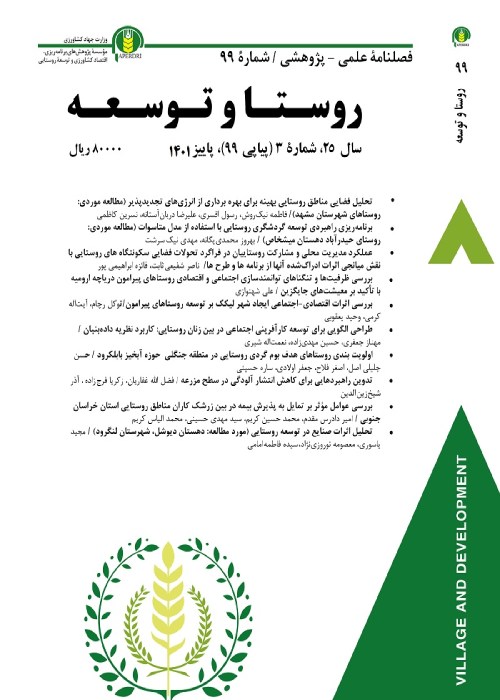Evaluating the Effects of Sustainable Tourism on Reducing Rural PovertyCase Study: Target Villages for Tourism in Ardel Township
In order to alleviate poverty and reduce migration, create social welfare, preserve the characteristics of traditional culture, preserve the traditional fabric, and create job opportunities, sustainable tourism is considered a basic and necessary element in rural areas. In general, tourism contributes to the economic development of the local community and improves the quality of life in rural areas; therefore, this industry can be introduced as the most important strategy for rapid employment generation in some areas. Consequently, in recent years, the importance of the tourism industry as a solution to reduce rural poverty, especially in developing countries, has been noticed by policymakers. Currently, the main emphasis to achieve poverty is focused on the role and impact of sustainable tourism. Sustainable tourism plays a fundamental role in the poverty of rural households by increasing economic growth and maintaining and increasing food production, creating intergenerational justice, and maintaining basic production resources. In this regard, in the present research, modeling of the effects of sustainable tourism in the poverty of rural households and answering the following questions are discussed:1- What is the level of poverty in the villages of the study area? 2- Which dimension of sustainable rural tourism is the most important factor affecting poverty in the studied area?
The statistical population of the current research consists of households of tourism target villages, rural managers of Ardel city, experts and elites. According to the announcement of the General Department of Cultural Heritage, Tourism and Handicrafts of Chaharmahal and Bakhtiari province, Ardel city has 10 tourism target villages, and this research was conducted in the period of December to February of 2018. Ten villages targeted for tourism have 3038 households and 11174 people. Using Cochran's formula, the number of samples required to complete the questionnaire of 310 households was calculated. Based on the nature and method of data collection, the current research is a descriptive-survey research (questionnaire), the design of the questionnaire indicators has been done using the theoretical research literature, the review of relevant research and interviews with experts and managers, and the type of questions is based on the Likert scale. 5 spectrums were categorized from very low (1) to very high (5). Descriptive statistics (mean and standard deviation) and inferential statistics (logistic regression and independent t-test) were used to analyze the data. Logistic regression is a statistical technique to show the effect of quantitative variables on a bivariate dependent variable. Logistic regression analysis is similar to linear regression analysis, but with the difference that in logistic regression, the dependent variable is a bivariate variable.
Findings show that 31.7% of households are in poverty and 68.3% are in the non-poor group. Based on the logistic regression model, the predictability of the model has been discussed. Based on this, the results show that in the first stage, where only the social dimension of sustainable tourism is included, the accuracy of classification of people by the model is equal to 68%, that is, in this stage, 95 households are correctly classified as poor and 207 households are correctly classified as non-poor; while 3 households are wrongly called poor and 4 households are also wrongly classified as non-poor. In the second stage, with the introduction of the economic dimension of sustainable tourism, the resolution of the model increased to 79%, but in the third stage, with the introduction of the physical dimension of sustainable tourism, there was no change in the resolution. Also, the results show that the discrimination power of the model for non-poor strata is higher than for poor groups, so that in the fourth step and with the inclusion of all four dimensions of sustainable development, the discrimination power for non-poor households is equal to 91.6%. According to this relationship, the economic dimension of sustainable development has the greatest impact and the environmental dimension has the least impact; therefore, in the final result, it can be said that within the scope of the study, the indicators of the economic dimension of sustainable tourism, the most important of which are the diversity of economic activities, the amount of income, access to financial credits, etc., are effective in reducing the poverty of rural households.
According to the results, to deal with rural poverty, due to the limited facilities and the extent of the rural community, and also to ensure the success in reducing poverty, the economic diversification programs such as the expansion of tourism can be used. Also, considering the two-way relationship between tourism development and increasing investment in villages, it is very important to create incentive mechanisms for investment according to the potential of the studied villages; Also, national, regional and local governments should consider tourism as one of the strategic pillars of rural development policies to understand the role that this area can play as part of a diverse rural economy and implement active policies to promote it; National, regional and local governments should fully integrate tourism into their development plans. Factors that should be considered include the territorial identity and specific characteristics of rural destinations, as well as policies for distributing tourism benefits throughout the country and turning tourism into an effective tool for comprehensive, resilient and sustainable development for rural areas.
- حق عضویت دریافتی صرف حمایت از نشریات عضو و نگهداری، تکمیل و توسعه مگیران میشود.
- پرداخت حق اشتراک و دانلود مقالات اجازه بازنشر آن در سایر رسانههای چاپی و دیجیتال را به کاربر نمیدهد.





